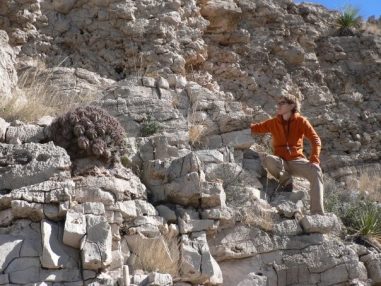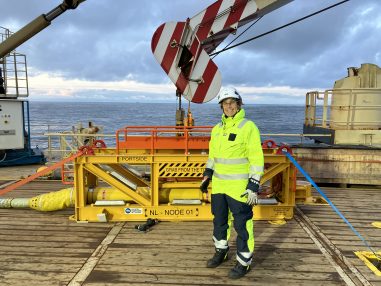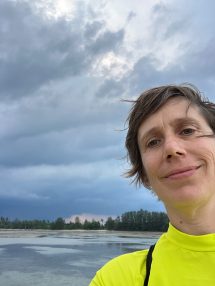Alumni Update: An interview with Beatriz Garcia-Fresca (M.S. ’04; Ph.D. ’09)
April 18, 2024

Why did you choose to attend the Jackson School, and why did you study the geosciences?
I grew up hiking and camping, mesmerized by mountains, rivers, the sky, rocks and trees. So I decided to study geology to understand how it all played together with only a slight idea of what geologists did for a living.
I earned my undergraduate degree in Geology at the University of the Basque Country in Bilbao. During my senior year, I applied to the Erasmus exchange program between European universities. One day, I was told I had been awarded a scholarship for an exchange program, and I began to wonder: would I be going to Grenoble, Padova, Manchester, or Tübingen…? Then the exchange program officer explained to me that I had an offer to do an exchange program in Austin, Texas! I was shocked and delighted, and off I went. This was a slight detour from my plan, but I embraced it and embarked on it with enthusiasm, knowing it would not be the last detour.
After a fabulous year at The University of Texas, I returned home and worked for two years as a hydrogeologist. Then I returned for a Master’s and stayed for a PhD.
During your time at the Jackson School, did you take advantage of internship opportunities?
I completed two internships while working on my PhD.
My first internship was with Shell in the Netherlands, where I learned how large oil and gas corporations function and expanded my network in Europe.
The second internship was with Chevron in California, where I was given the opportunity to pioneer and demonstrate the use of fluid-rock interaction modeling applied to diagenesis and reservoir quality. This experience significantly influenced the later stages of my PhD, profoundly impacted my career, and led to a job at Chevron.
What is your current position?
I work at Equinor on the team developing the Empire Wind wind farm offshore New York. I am in Singapore, overseeing the construction of the offshore substation, and I’m responsible for ensuring it’s built on time and on schedule.
 Which lessons learned at the Jackson School have served you well in your profession?
Which lessons learned at the Jackson School have served you well in your profession?
At The Jackson School of Geosciences, I learnt about the fun and wonders of geological field studies that still bring me joy today. Secondly, I evolved from a geology student into a geoscientist in the full sense of the word ‘scientist’: pursuing curiosity, developing and testing hypotheses, collecting data in the field or the lab, engaging in deep intellectual work, evaluating and interpreting, and more. In broader terms, I learnt how to be open-minded, think big and small and sideways, the value of learning from others, and sharing knowledge.
What’s your favorite memory from your time at the Jackson School?
There are too many to choose from!
Jack Sharp singing “On the Road Again” on the suburban CB during field trips.
Bob Goldhammer on a meeting to prepare for a field trip: “First of all: are we going acoustic or electric?” (referring to which guitars we were to pack)
Charlie Kerans asked if I would join on a fieldwork outing: “Will you go and pack your bag already, or will you let common sense get in the way?”
A carbonate sedimentary structure exam by Bob Folk, where he put a slab of hydrothermally altered red tidal flat limestone in front of the class, said, “You have until tomorrow to tell me which way is up,” and walked away. A few days later, he told us something along the lines of “You have all passed the exam, and I enjoyed very much reading the different discussions and arguments, but I haven’t the slightest idea of which way is actually up.”
Is there a specific professor at the Jackson School who inspired you?
It would be impossible to single one out: Jack Sharp, Jerry Lucia, Charlie Kerans, Bob Goldhammer, Bob Loucks, and others all inspired me in different ways along my journey. Their deep knowledge, enthusiasm, dedication, and the research groups they built around them all contributed to the geologist I became and the professional I am today.
But perhaps I would pick Bob Folk, an emeritus professor when I was a student. He showed up to the DGS every day, worked on his microscope, and spent hours at the library digging for information and engaging with undergrads. Throughout his life, he studied and pursued whatever he found interesting and important with unparalleled intellectual sharpness and humor. His office door was always open, and he was always ready to engage in discussions, from the scientific to the philosophical, deep and shallow.
I must also add that I was impacted by the female professors who weren’t there when I first arrived at UT and was relieved to see a shift in this over time.
 Did you have any experiences at the Jackson School that changed how you see the world?
Did you have any experiences at the Jackson School that changed how you see the world?
I first came to the Jackson School as an exchange student from a small university in the Basque Country (Spain). That single experience was the most deeply life-shaping thing I have done in my life and set the pattern for many more to follow.
After that, I must mention that the fieldwork focus at the Jackson School is unparalleled in any geology program in the USA and the world. I spent more time in the field as a student than some geologists would accumulate in their lifetimes. I believe there’s no better place to learn and practice geology than out on the outcrops, and I’m very grateful for the many and diverse opportunities I had at the Jackson School to develop as a field geologist.
